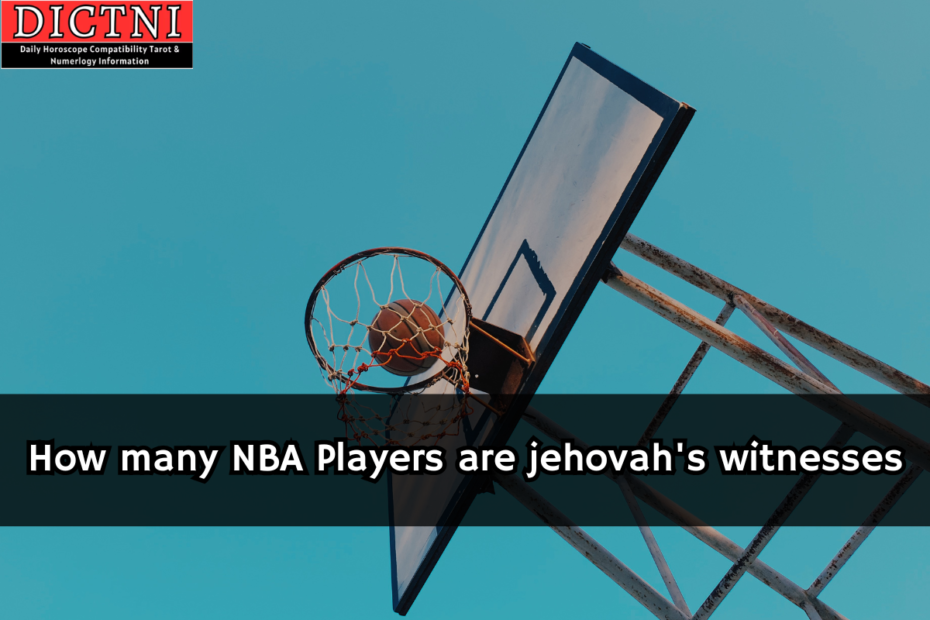Introduction
The National Basketball Association (NBA) is a multicultural league that welcomes players with a wide range of cultural backgrounds and worldviews. There are a number of different religious affiliations represented in the NBA, but Jehovah’s Witnesses are one of the most prominent groups. This article explores NBA players that follow Jehovah’s Witness beliefs and values, delving into the connection between faith and basketball.
Comprehending the Witnesses of Jehovah
Members of the Christian denomination known as Jehovah’s Witnesses were founded in the United States in the late 1800s. They are well-known for their unusual views and customs, which include refusing to serve in the armed forces, not saluting the flag, and devoted to evangelizing neighbors door-to-door. Their core beliefs are that God’s kingdom will soon come to Earth and that following the moral and ethical guidelines found in the Bible is crucial.
NBA Players Following the Witnesses of Jehovah
Even though players in the NBA come from a variety of backgrounds and faiths, several openly identify as Jehovah’s Witnesses. The following prominent NBA players practice this faith:
Serena Williams: The renowned tennis star Serena Williams is a Jehovah’s Witness in addition to being a prominent athlete, despite not being an NBA player. Her dedication to her religion has received extensive media coverage, and her accomplishments serve as an example of how a committed Jehovah’s Witness may coexist with being a top-tier athlete.
Princepal Singh: The Indian basketball player who signed with the NBA G League’s Ignite, Princepal Singh, has made his Jehovah’s Witness membership known in public. Singh is a rising star in the world of basketball, and his commitment to his faith shapes who he is both on and off the court.
Dwight Howard: A seasoned and talented center, Howard has been transparent about his Jehovah’s Witness beliefs throughout his NBA career. One of the recurring themes in Howard’s personal biography has been his steadfast adherence to his religious convictions, which has added to the complexity of his public persona.
Managing the Spiritual Challenges in the NBA
Professional basketball players have a unique set of difficulties in their career, which can be exacerbated by their allegiance to a particular religion, such as Jehovah’s Witnesses. Among the difficulties and things to think about are:
Conflicts with Scheduling: The NBA season has a tough schedule that involves a lot of travel and games on weekends and holidays. Attendance at religious gatherings and events is usually given priority by Jehovah’s Witnesses, which could clash with the NBA schedule.
Jehovah’s Witnesses conscientiously object to military duty, a position that is consistent with their dedication to nonviolence. NBA players who follow the Jehovah’s Witnesses religion may have to make judgments and have conversations about community involvement, particularly when those decisions involve military-related duties.
Refusal to Salute the Flag: Patriotic gestures like saluting the flag are not observed by Jehovah’s Witnesses. When it comes to pre-game ceremonies and rituals, NBA players who practice Jehovah’s Witnesses may need to negotiate public impressions and politely explain their religious beliefs.
Juggling Evangelism and Public Image: One of the main pillars of the Jehovah’s Witnesses’ religion is evangelism. NBA players who practice Jehovah’s Witnesses may have to strike a balance between upholding their work connections and promoting their beliefs and keeping a good public image.
Case Studies: The NBA’s Jehovah’s Witnesses
Serena Williams is a prominent example of a high-profile athlete who is a Jehovah’s Witness, despite not being an NBA player. Her experiences in the tennis world, along with her open displays of faith, highlight the convergence of religion and sport.
Dwight Howard: Dwight Howard’s NBA career has been distinguished by his dedication to his faith in addition to his on-court accomplishments. Howard has continuously incorporated his Jehovah’s Witness identity into his public presence, whether it be during his early years with the Orlando Magic or his later tenure with different organizations.
Princepal Singh: Princepal Singh is a rising star in the NBA G League Ignite. His path as a basketball player is interestingly enhanced by his Jehovah’s Witness identity. Keeping his religion intact while navigating the difficulties of being a young, well-known athlete brings special considerations.
Conclusion
The NBA’s collective identity is made more diverse by the presence of players who identify as Jehovah’s Witnesses. The NBA is still showing how committed it is to creating a welcoming atmosphere where players can be themselves while navigating the opportunities and challenges brought forth by their beliefs.
Professional athletes like Serena Williams, Princepal Singh, and Dwight Howard have experiences that demonstrate how well religion and athletics can coexist. By welcoming diversity, the NBA not only captures the complexity of its players but also serves as a model for other sports leagues across the globe. Regardless of their cultural or religious background, players are encouraged to bring their entire self to the court as the league continues to grow and develop.
